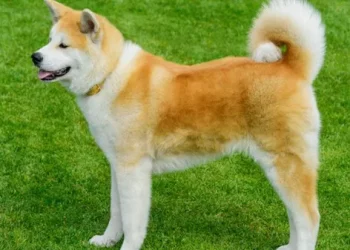The Akita puppy is an adorable, playful, and energetic little ball of fur that requires a lot of love and attention from its new owner. Proper nutrition is crucial during the first few months of an Akita puppy’s life, as it is during this time that they grow and develop at a rapid pace.
Today, we will discuss what to feed an Akita puppy to ensure they get the best start in life.
-
Choose a High-Quality Puppy Food:
The first step in feeding an Akita puppy is to choose a high-quality puppy food. Look for a brand that is specifically formulated for puppies and provides all the necessary nutrients for their growth and development. The food should contain high-quality proteins, fats, and carbohydrates, as well as essential vitamins and minerals.
-
Consider a Grain-Free Diet:
Many Akita puppies are sensitive to grains, and some may even develop allergies to them. Therefore, it may be a good idea to consider a grain-free diet for your puppy. Look for a puppy food that is made with high-quality meats, such as chicken, beef, or lamb, and does not contain any grains, such as wheat or corn.
-
Feed Your Akita Puppy Small Meals:
Akita puppies have small stomachs and cannot eat large meals at once. Therefore, it is best to feed them small meals throughout the day. Aim to feed your puppy three to four times a day, with each meal consisting of a small portion of food.
-
Provide Fresh Water:
Fresh water is essential for an Akita puppy’s health and well-being. Always ensure that your puppy has access to clean, fresh water throughout the day. Change the water frequently to ensure it remains fresh and clean.
-
Avoid Table Scraps and Human Food:
While it may be tempting to share your food with your Akita puppy, it is best to avoid giving them table scraps and human food. Many human foods can be harmful to dogs and can cause digestive upset, diarrhea, and other health problems.
-
Treats in Moderation:
Treats can be an excellent way to reward your Akita puppy for good behavior, but they should be given in moderation. Too many treats can lead to weight gain and other health problems. Look for treats that are specifically formulated for puppies and avoid those that contain artificial colors, flavors, or preservatives.
-
Monitor Your Puppy’s Weight:
Monitoring your Akita puppy’s weight is essential to ensure they are getting the proper nutrition they need. Overfeeding can lead to obesity and other health problems, while underfeeding can lead to stunted growth and developmental issues. Always consult with your veterinarian if you have any concerns about your puppy’s weight or nutrition.
Feeding an Akita puppy requires careful consideration and planning to ensure they get the proper nutrition they need to grow and develop. Choosing a high-quality puppy food, providing fresh water, feeding small meals throughout the day, avoiding table scraps and human food, giving treats in moderation, and monitoring your puppy’s weight are all essential components of a healthy diet. By following these tips, you can ensure that your Akita puppy gets the best start in life and grows into a happy and healthy adult dog.


























